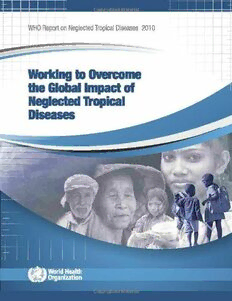
WHO Report on Neglected Tropical Diseases 2010: Working to Overcome the Global Impact of Neglected Tropical Diseases PDF
184 Pages·2010·2.958 MB·English
Most books are stored in the elastic cloud where traffic is expensive. For this reason, we have a limit on daily download.
Preview WHO Report on Neglected Tropical Diseases 2010: Working to Overcome the Global Impact of Neglected Tropical Diseases
Description:
Neglected tropical diseases blight the lives of a billion people worldwide and threaten the health of millions more. These close companions of poverty weaken impoverished populations, frustrate the achievement of health in the Millennium Development Goals and impede global public health outcomes. Wider recognition of the public health significance of neglected tropical diseases and better knowledge of their epidemiology have stimulated necessary changes in public health thinking to approach and achieve control. The World Health Organization recommends five control strategies or intervention processes: preventive chemotherapy, intensified case management, vector control, veterinary public health, and safe water, sanitation and hygiene. Although one strategic approach may take the lead for the control of a specific disease or group of diseases, evidence suggests that more effective control follows when the five processes operate in combination and in the local context.This report presents evidence to demonstrate that activities undertaken to prevent and control neglected tropical diseases are producing results—and that achievements are being recognized. By 2008, preventive chemotherapy had reached more than 670 million people in 75 countries.Leadership from WHO has catalyzed the formation of a community of partners committed to supporting the governments of countries where these diseases are endemic with a shared purpose: working to overcome the global impact of neglected tropical diseases, and reducing the burden of morbidity and mortality that they impose on the health of their citizens and the economic productivity of their states. These diverse partners include bilateral and philanthropic donors, pharmaceutical companies, nongovernmental organizations, universities and charitable agencies; their dedicated resources are essential to deliver interventions and expand control of neglected tropical diseases to the millions of people in need.
See more
The list of books you might like
Most books are stored in the elastic cloud where traffic is expensive. For this reason, we have a limit on daily download.
